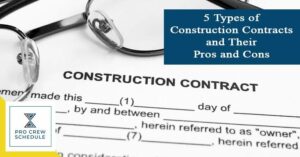5 Types of Construction Contracts and Their Pros and Cons

When managing construction projects, understanding the different types of contracts is crucial, as they determine what you pay, what you’re liable and accountable for, including other aspects of the job. It is the contract that protects the builder and the owner himself by ensuring expectations are clear from the start, avoiding possible conflicts caused by overages and unforeseen issues.
There are several types of contracts, and each is tailored to the unique needs of a particular project. To get you familiar with these types of contracts, read this blog to understand and learn more. It will help you create successful contracts for your construction business.

1. Lump Sum Contracts
Lump-sum contracts, also defined as fixed-priced contracts, are considered one of the most basic construction contracts. It is primarily because the contract itself is being outlined as one fixed price in every work done under them. For such reasons, this type of contract is widespread in the construction sector. Odds are, the majority of the contractors in the past have entered into several lump-sum contracts. Yet, as simple as one price formula seems, in general, lump sum contracts are not so cut-and-dry. Here are the pros and cons of this particular contract.
Pros:
- Finishing under the budget means much higher profit margins – the price of the project is already set into stone. In other words, it’s finally decided. So, finishing under the budget only means you can pocket the savings.
- It simplifies the bidding – calculating a total price rather than delivering/submitting multiple bids can streamline the selection process both for the contractor and the owner.
Cons:
- The bigger the construction project means more room for loss – if you are working with suppliers and subs, there’s should be no room for errors. The possible costs of the unexpected setbacks and missteps from sub tiers may come right out of the lump sum price.
- Miscalculations destroy the margins – when drafting a lump sum contract, it’s crucial to account for all variables. Since there’s one set price, unanticipated changes and setbacks during the project directly cut into your profit margin. And you don’t want that to happen.
2. Cost-Plus contracts
This type of contract is otherwise known also as a cost-reimbursement contract. Cost-plus contracts typically involved the owner, who will pay the contractor for the overall costs incurred during the project’s duration. There’s also a set amount of money for profit that’s being included. It can be determined by the percentage of the overall price of the construction project.
The costs usually covered by this contract involved direct costs (materials and labor), and indirect costs (communication and travel expenses), and profit.
Pros:
- These contracts are flexible – cost-plus contracts can allow the owners to create design changes along the way. The contractors can also know ahead that they will be paid for the extra materials and time those changes incur.
- Miscalculations aren’t devastating – since this contract is very flexible by nature, any inaccuracies in the first bid aren’t very detrimental compare to lump-sum contracts.
Cons:
- Justifying some of the costs can be tough – this type of contract requires contractors to justify the costs on a specific project. There are times that these costs can be challenging to account for. The owners might be resistant to reimburse indirect costs such as mileage and administrative expenses.
- Fronting the materials costs can put contractors in the bind – since this contract operates through reimbursement, paying more of what you expected for the materials can also mean you’re spread thin for the rest of the project.
3. Unit Price Contracts
This type of contract usually divides the whole work required to finish the construction project into separate units. These contracts are also referred to as measure and pay contracts, measurement contracts, or premeasurement contracts. As a contractor, you can provide the owner with price estimates for every unit of work rather than giving them an estimate for a particular project as a whole.
This contract is beneficial for construction projects, in which the work is being tedious and heavily relies on material costs. Here are its advantages and disadvantages:
Pros:
- Unit price contracts simplify invoicing – this contract allows for increased transparency. It helps arguments and disputes when it’s time to pay up.
- If more work is required, the profit margin stays the same – any extra necessary job is being added on as an additional pre-priced unit, making it easier to handle change orders and some alterations to the scope of the work.
Cons:
- Re-measurement delays payment – it’s also known as the owner’s ability to compare each unit’s price. In most cases, it slows down payments.
- Forecasting the final value of the contract is difficult – typically, the amount of units needed to finish a project isn’t known quickly.
4. Guaranteed Maximum Price contracts
GMP contracts establish a cap when it comes to the price of a contract. With GMP, the property owner can’t exceed the contract price. So, any labor costs or materials above that price should be covered by a contractor like you. GMPs are a common aspect in construction contacts and best-fit construction projects with few unknowns.
Pros:
- It incentivizes savings – The owners or your clients may agree to share to cost savings with you.
- It’s for quicker projects – Having a finalized contract price can speed up the bidding process. It can also make the financing project much easier because the maximum amount is determined early on.
Cons:
- It can placed risks on contractors – Unfortunately, this contract forces your party to absorb cost averages when the contract price maximum is being exceeded.
- It may take longer to negotiate and review – The negotiation process may be elongated and the project may take longer to start.

5. Time and Materials Contract
Time and Management contracts work best for construction projects where the scope of work isn’t well-defined. This type of contract reimburses you for materials costs and builds an hourly or daily pay rate. So here’s an overview of the advantages and disadvantages of time and materials contracts:
Pros:
- Simple negotiations are allowed – unexpected roadblocks, delays, and other possible changes to the scope of work are covered.
- These contracts are fragile – setting rules when it comes to the selected materials and hourly wage is easy and much more straightforward with this type of contract.
Cons:
- It’s time-consuming – logging material cost every single time is no small task. Failure to deliver the correct number upon completion may mean lower profit margins—no more time crunching numbers when using task management programs. Having to use this advanced software tool can make the work much easier and faster yet efficient.
- Efficiency isn’t rewarded – Since this contract pays by the hour or day, there are no real incentives to finish the project early.
Best Practices for Writing Construction Contracts
Whichever type of construction project you are planning, you may apply the best practices below. Doing so ensures your contract to be a clear and a detailed arrangement.
- Include incentives – Creating incentives is one of the great ways to set a construction project primarily when you aim or succeed. Incentives are beneficial when the scope isn’t determined and time, labor costs, and budget are up in the air.
- Clearly outline expectations – Be clear when declaring your expectations on how expenses will be reported to you. Outline a contract and break it down into key points.
- Create contingencies – The best construction contracts are the ones that have contingency plans. When your construction project has contingencies, you and your client have a roadmap of what to do.
- Implement project task management – having the right way of managing every aspect of the project can help you outline expectations clearly. There’s increased transparency in the roadmap you’re making.
When creating construction contracts, there are things you need to avoid. Make sure to pay attention to the following and best avoid it:
- Not establishing communication – When writing a contract, specify exactly how and when you should communicate. Both parties should know when to run something by one another even before making decisions. Lack of communication is detrimental to the success of your projects.
To improve communication, and collaboration with all the parties involved in the contract, use subcontractor scheduling software. You, your team and other parties involved can connect with one another seamlessly anywhere and anytime.
- Not being particular or specific – To generalize rather than specify is one common mistake. Always know that the main point of the contract is to detail the specific terms of the agreement between you and your client. There should be no room for interpretation.
- Not detailing how to handle some changes – Changes are inevitable in almost all projects because for many reasons – countless moving parts and many parties involved. That’s why it’s crucial to let any adjustments be part of the project.
Use Construction Scheduling Software for your Construction Contracts
The number of advanced tools everybody’s using today is quite impressive. Despite the construction sector being late in adopting the latest technologies, the industry is making progress in this area. In fact, there are a lot of powerful tools you can use today to make the management of your contracts much simpler and more accessible.
Pro Crew Schedule is the leading project management tool in the market. It gives you the power to manage construction projects, including many elements like contracts, from beginning to end. Create a detailed project plan, complete your documents, manage your contracts, assign tasks to your crew, supervise your crew anywhere or anytime with Pro Crew Schedule!
Key Takeaways
Understanding the various types of construction contracts can help you decide what type of contract fits you and your construction projects. In fact, contracts aren’t the only thing that matters the most. There are also other moving parts to consider, such as the amount of labor you need, the construction techs you need to invest in, and the central machinery you also need for your projects.




